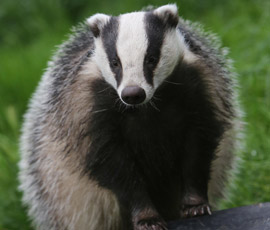NFU Conference 2013: Badger cull farmers ‘must get protection’

Farmers taking part in the badger cull pilots must be given protection for their livelihoods and businesses from the activities of animal rights groups, the NFU conference was told.
UKIP MEP Stuart Agnew said he was concerned about the intimidatory practices that can be levied against farmers by animal rights campaigners.
He recalled how 10 years ago the anti-GM movement wreaked havoc on farmers trialling GM crops in the UK – and adequate security measures and protection for farmers were needed now to stop a repeat episode with the badger cull.
“That GM thing was really a microcosm about what the animal rights people can be involved in,” said Mr Agnew, who is also a Norfolk farmer and NFU member.
“I am genuinely worried about this because I watched farmers drop out of those trials like flies when they started to get silent phone calls and all the rest of it.
“I feel that we’ve got a few months now to try to get the government, to get the police, to get a helpline, so that when farmers are intimidated they can at least pick up the phone to somebody because this is going to be completely undermined if enough farmers drop out – it’s as simple as that.”
Animal rights activists were trying to persuade supermarkets not to buy products from farmers involved in the cull, he added.
And he said the NFU must seek clear commitments from supermarkets that they will continue to buy products from farmers in the pilots.
“We have two or three months to talk to the supermarkets – we are on a roll now,” he said, speaking at a breakout session on animal health and welfare at the conference on Thursday (28 February).
“We have got them under the cosh, so to speak, with this horsemeat thing, so if these people try to persuade the supermarkets not to buy farmers’ products, they will say, ‘well, we have decided we are going to’. Otherwise, I feel the badger cull will collapse.”
NFU vice-president Adam Quinney said: “We are working very closely with DEFRA on this. There is a joint management board looking at how we work; the police are involved, too.
“Since the pause last autumn, there has been a tremendous amount of work in those areas and what has been pleasing is the commitment by those farmers.
“They have shown massive commitment in this and I am very pleased that there has been no fallout of membership, either from the farmers or the contractors down there. The full licences have been issued.”
DEFRA’s deputy director Lee McDonough urged everybody involved in the cull -from government ministers to farmers – to take security issues “really seriously”.
“We are all in this together. We are taking decisions really seriously. I personally feel very reassured in terms of the partnership working we are seeing now,” she added.
Natural England announced on Wednesday (27 February) that full cull licences have been issued for the two pilot areas – west Somerset and west Gloucestershire.
DEFRA secretary Owen Paterson said he was committed to starting the badger cull pilots this summer, as part of DEFRA’s Bovine TB Eradication Programme for England.
Meanwhile, Michael Seals, chairman of the Animal Health and Welfare Board for England (AHWBE), said the TB Eradication group would publish a major new bovine TB strategy later this year.
Mr Seals said the strategy would cover all areas of the disease and was designed to reinstate the UK’s official TB-free status.
But he warned that there was “no silver bullet” on bovine TB and it would take years of work to deliver results.
